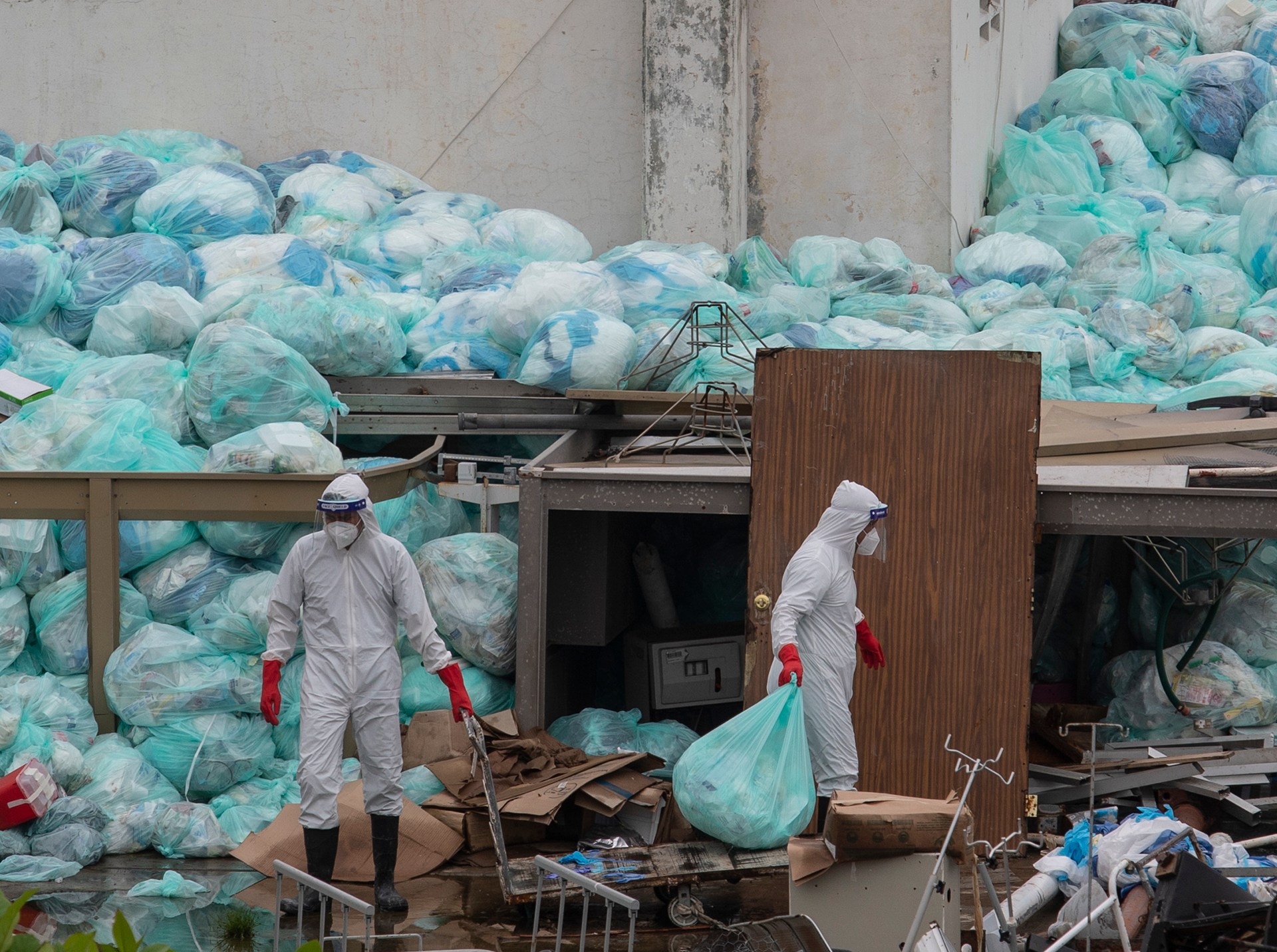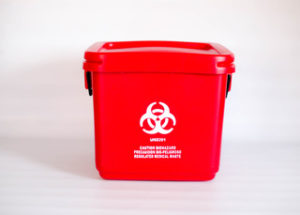Medical Waste Removal Quality: Your Trusted Partner in Safe Biohazard Disposal
Medical Waste Removal Quality: Your Trusted Partner in Safe Biohazard Disposal
Blog Article
The Significance of Appropriate Garbage Disposal Practices
The administration of waste is an important facet of environmental stewardship that often goes undetected in our lives. Appropriate garbage disposal practices are not just a matter of comfort yet are crucial for safeguarding our environments and public health and wellness. From the effects of inappropriate garbage disposal on our setting to the lasting implications for future generations, the importance of taking on lasting waste management methods can not be overstated. By checking out the ecological influence of careless waste disposal, the advantages of reusing initiatives, and the value of neighborhood engagement in waste reduction efforts, a deeper understanding of why appropriate garbage disposal techniques are essential arises.
Ecological Influence of Improper Disposal
Inappropriate disposal of waste postures a significant threat to the atmosphere due to its harmful results on ecological communities and human health and wellness. When waste is not correctly taken care of, it can bring about air pollution of the water, air, and soil, creating damage to numerous plant and animal species. click here. Chemicals and toxins from improperly disposed waste can permeate right into the ground, infecting groundwater resources and affecting the wellness of both wildlife and humans
Furthermore, the accumulation of waste in land fills creates greenhouse gases like methane, contributing to environment change and global warming. Improper disposal techniques likewise cause littering, which not only weakens the aesthetic worth of the atmosphere however can likewise hurt wildlife via intake or entanglement.
To alleviate these ecological influences, it is vital for individuals and areas to embrace proper garbage disposal techniques such as recycling, composting, and accountable contaminated materials disposal. By taking these steps, we can aid protect communities, preserve natural deposits, and protect human health for current and future generations.
Benefits of Recycling Programs
Regularly participating in reusing programs uses various benefits for both the environment and society as a whole. This preservation of sources not just assists in maintaining ecological balance but additionally adds to sustainable development.
Moreover, reusing plays an important role in lowering power usage and greenhouse gas exhausts. The production of goods from recycled materials generally needs less power contrasted to producing from virgin resources - medical waste removal. Consequently, the carbon footprint connected with the production procedure is considerably lowered, aiding in the fight versus environment adjustment
In addition, reusing programs produce job possibilities in the recycling sector, advertising financial growth and social welfare. By motivating the recycling and reuse of materials, these programs support a circular economic climate that lessens waste generation and optimizes source effectiveness, ultimately bring about a cleaner, greener future for generations ahead.
Hazardous Waste Administration Standards
Executing effective contaminated materials monitoring guidelines is critical for minimizing environmental and wellness threats associated with the incorrect disposal of dangerous materials - click here. Correct handling, treatment, and disposal of contaminated materials are vital to protect against contamination of dirt, water resources, and air
One key guideline is correct labeling of contaminated materials containers to make certain risk-free handling and transportation. Furthermore, facilities have to comply with strict storage space demands to avoid leaks, spills, or accidents that might endanger human health and the environment. Regular training programs for workers on contaminated materials management techniques are likewise important to guarantee conformity with policies and promote a culture of safety and security.
Additionally, contaminated materials ought to be set apart based upon its homes to avoid chain reactions that might cause unsafe situations. Executing a comprehensive waste radar can aid keep an eye on the movement of hazardous materials from generation to disposal, making sure transparency and responsibility. By complying with these standards faithfully, sectors and businesses can add to a safer and cleaner environment for future and present generations.
Community Involvement in Waste Reduction
To efficiently address click here now the ecological and wellness risks associated with harmful waste management, engaging the neighborhood in waste reduction campaigns is paramount. Community involvement plays an essential role in promoting lasting waste administration practices and cultivating a culture of environmental responsibility. By educating locals concerning appropriate waste segregation, recycling, and composting techniques, neighborhoods can dramatically decrease the quantity of waste sent out to land fills, therefore lessening ecological contamination and saving natural deposits.
Neighborhood participation in waste reduction programs additionally aids in raising understanding concerning the significance of waste minimization and encourages individuals to embrace eco-friendly routines in their daily lives - medical waste removal near me. Collective efforts in between neighborhood authorities, waste monitoring business, and area members can bring about the application of reliable waste reduction techniques tailored to the details needs of each community or town
In addition, area engagement promotes a sense of possession and liability among residents, equipping them to take positive actions in the direction of minimizing waste generation and promoting a cleaner, healthier environment for present and future generations. By collaborating in the direction of typical waste decrease goals, communities can make a significant influence on mitigating the unfavorable impacts of inappropriate garbage disposal practices.

Future of Sustainable Waste Practices
Conventional waste disposal approaches, such as landfilling and incineration, are no much longer lasting in the lengthy term due to their considerable environmental impacts. Moving forward, the future of sustainable waste methods exists in welcoming a circular economic situation method, where resources are recycled, reused, or repurposed to lessen waste generation.
Technological advancements play a vital duty fit the future of lasting waste methods. Advanced waste sorting and reusing modern technologies can aid boost the effectiveness of waste administration processes, enabling the recovery of useful sources from waste streams. Furthermore, the adoption of naturally degradable products and composting methods can help in reducing the amount of natural waste ending up in land fills, therefore alleviating greenhouse gas discharges.
Additionally, promoting customer awareness and education and learning on proper waste partition and disposal practices is essential for driving behavioral modification in the direction of sustainability. By promoting a society of waste reduction, recycling, and reuse, communities can collectively add to a cleaner and healthier environment for future generations.

Conclusion
Finally, proper waste disposal methods are critical for reducing environmental effect and promoting sustainability. By implementing reusing programs, taking care of contaminated materials properly, and motivating community participation in waste reduction efforts, we can function in the direction of a cleaner and much healthier setting. It is necessary for people, organizations, and governments to focus on sustainable waste methods for the future wellness of our earth.

From the repercussions of incorrect waste disposal on our setting to the lasting effects for future generations, the significance of adopting lasting waste monitoring techniques can not be overstated. By discovering the ecological effect of irresponsible waste disposal, the benefits of reusing campaigns, and the value of area involvement in waste reduction initiatives, a deeper understanding of why appropriate waste disposal practices are vital emerges.
By informing homeowners concerning proper waste partition, reusing, and composting strategies, neighborhoods can dramatically decrease the amount of waste sent to land fills, thereby lessening environmental air pollution and conserving all-natural resources. (click here)
Moving forward, the future of lasting waste practices exists in accepting a circular economy technique, where resources are recycled, recycled, or repurposed to lessen waste generation.
Advanced waste sorting and reusing technologies can aid enhance the efficiency of waste monitoring processes, permitting for the recovery of beneficial sources from waste streams.
Report this page